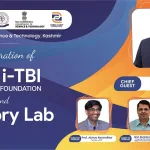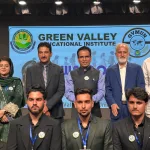CHARANJIT SINGH | GAJANAN RAUTA
India has transformed its food system from a highly deficient one in the mid-1960s to one that is self-reliant and surplus now. Feeding India’s growing population may remain a major challenge in the future, because of the climate challenge affecting quality of natural resources such as land, water, and air. While India grapples with such challenges, the agricultural sector is undergoing a transformative journey driven by technological advancements.
The other challenge is to enhance farmers’ income and for this the adoption of improved agricultural technologies is the way forward. It has the potential to revolutionize farming, making it more efficient, profitable, and sustainable. From farm mechanization that reduces costs and increases productivity to AI-powered crop monitoring, data-driven decision-making and crop advisory services carry the potential in enhancing efficiency, sustainability of farming. In fact, India’s agriculture industry is on the cusp of a major technological transformation.
Drone Technology: prospects to transform Indian Agriculture
Drones, or unmanned aerial vehicles (UAVs), are becoming increasingly popular in the agriculture sector in India. Further, Government of India is actively promoting the use of drones in agriculture, especially for crop assessment, digitization of land records, and spraying of insecticides and nutrients. For building ecosystem, the Government has taken following key steps:
- Liberalized Drone Rules, 2021: These rules were notified on August 25, 2021, easing regulations for drone usage.
- Production-Linked Incentive (PLI) scheme for drones and drone components to boost indigenous manufacturing and promote growth in the drone industry.
- Amendment in the guideline of Sub-Mission on Agricultural Mechanization (SMAM). Farm Machinery Training & Testing Institutes, ICAR institutes, Krishi Vigyan Kendras, and State Agriculture Universities are provided grants of up to 100% of the cost of agriculture drones or INR 10 lakhs, whichever is less.
- Custom Hiring Centers (CHCs) and Hi-tech Hubs: Existing CHCs can receive financial assistance of 40% of the basic cost of drones (up to INR 4 lakhs) for purchasing drones. New CHCs established by Cooperative Societies of Farmers, FPOs, and Rural entrepreneurs can include drones as part of their machinery projects.
- Drone Import Policy dated 09 Feb 2022 prohibits the import of drones in Completely-Built-Up (CBU), Semi-knocked-down (SKD), or Completely-Knocked-Down (CKD) form. While the import of fully assembled drones is restricted, the import of drone components has not been banned.
- Drone Shakti initiative, announced during the Budget 2022, aims to promote and facilitate drones as a service through start-ups in India.
- Drone (Amendment) Rules, 2022: Abolished the requirement for a drone pilot license on February 11, 2022.
NAMO Drone Didi Scheme
Hon’ble Prime Minister in his 77th Independence Day address said “We will train women in SHGs to fly drones and also repair drones. The Government of India will provide drones to thousands of Women Self Help Groups (SHG).” Accordingly, a new Central Sector Scheme ‘NAMO DRONE DIDI’, was conceptualized for providing drones to the women SHGs. The Union Cabinet approved the Scheme with an outlay of Rs. 1261 Crores for the period from 2024-25 to 2025-26.
Objectives of the scheme
- To promote advance technology in agriculture for improved efficiency, enhanced crop yield and reduced cost of operation.
- To empower Women Self Help Groups (SHGs) promoted under DAY – NRLM as drone service providers, since they have emerged as an effective grassroots level institution for collective interventions.
- To provide business opportunities to Women SHGs promoted under DAY – NRLM to increase their income
- To increase the opportunities for rural employment and financial inclusion.
- To encourage use of Nano-fertilizers and to optimize the use of pesticides and fertilizers.
Key features of the Scheme
- Provision of drones to women SHGs: 15,000 drones will be provided to selected women Self Help Groups (SHGs) over three years (2023-24 to 2025-26).
- Collaboration with lead fertilizer companies: In 2023-24, 500 drones will be provided by Lead Fertilizer Companies, utilizing their resources. During 2024-25 and 2025-26, 14,500 drones will be distributed under the NAMO DRONE DIDI scheme.
- Package distribution: Drones will be provided as a comprehensive package, ensuring that SHGs have all necessary accessories and ancillary equipment.
Financial pattern
- Central financial assistance: Central Financial Assistance will cover 80% of the cost of drones and associated accessories or ancillary charges, up to a maximum of Rs 0 lakhs.
- Loan arrangement by CLF of SHGs: The Cluster Level Federation (CLF) of SHGs may raise the balance amount as a loan under the Agriculture Infrastructure Fund (AIF).
- Interest subvention: Interest subvention at a rate of 3% will be provided on the AIF loan, easing the financial burden on the SHGs.
Key Strategies for implementation
- Converging resources and efforts: Holistic interventions converging the resources and efforts of the Ministry of Agriculture and farmers Welfare, Rural Development and Department of Fertilizers.
- Selection criteria for implementation: Rightful selection of the area/cluster and SHG groups in rural areas under DAY – NRLM.
- Identification of feasible clusters: Appropriate clusters where the usage of drones is economically feasible will be identified.
- Selection of women SHGs: Progressive women SHGs under DAY – NRLM in the identified clusters will be selected for providing drones.
- Training for SHG members: One qualified member from the women SHGs will undergo a 15-day training program. This includes a mandatory 5-day drone pilot training and an additional 10 days of training for agriculture purposes such as nutrient and pesticide application.
- These trainings shall be provided as a package (along with the supply of drones) and shall be conducted at Remote Pilot Training Organization (RPTO) approved by Directorate General of Civil Aviation (DGCA). The training shall cover drone flying, understanding provisions of Drone Rules, SOPs for nutrient and pesticide application, drone flying practice and minor repair and maintenance of Drones.
- The training for agriculture purpose shall be conducted by a team consisting of drone manufacturers, experts from Central/State Institutes like SAUs, KVKs, ICAR institutes etc.
- Financial assistance and loan provision: Financial assistance and loans will be provided to the identified SHGs under DAY – NRLM for the purchase of drones.
- Facilitation by Lead Fertilizer Companies (LFCs): LFCs will act as intermediaries between drone manufacturing companies and SHGs. They will procure drones and transfer ownership to SHGs through MoUs with Cluster Level Federation (CLF).
- Collaboration with drone supplier companies: Lead Fertilizer Companies will sign MoUs with drone supplier companies for repair and maintenance services.
- Promotion of nanofertilizers: LFCs will promote the use of Nano Fertilizers by drones with SHGs.
Way Forward
The future prospects of drone technology are vast and promising, especially in sectors like agriculture, infrastructure, logistics, and public safety. In addition to precision agriculture, drones can be useful in livestock monitoring, disaster response and relief, medical supply delivery, especially in remote or inaccessible areas, monitor forest cover, wildlife habitats, and water bodies, aiding in biodiversity conservation and ecosystem management. By embracing drone technology and leveraging it for various applications, women in rural India can enhance their livelihoods, contribute to community development, and participate more actively in the socio-economic growth of their regions. Access to training, resources, and supportive policies will be crucial in enabling women to harness the full potential of drones for their benefit and that of their communities.
(Charanjit Singh is Additional Secretary, Ministry of Rural Development and Gajanan Rauta, is Programme Officer, Transform Rural India Foundation, TRIF)





